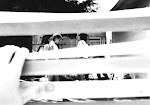As mentioned in my previous post, I was going to buy
The Dark Divine this weekend. Actually, I didn't -- and nothing against it as a book. I still may get it at the library (I'll be #15 on the hold list.) Instead I bought
The Book Thief, which about 2-3 years ago was a book with about the same status as
The Dark Divine -- that is, I wanted it but couldn't get it. Of course I'd forgotten about it until I saw it in B&N. If you delight Amazon's heart by following the link you'll see it's a Holocaust book, of sorts. There's a character in it name Hubermann. The first, slight, coincidence is that I used the name Huberman for a character in my WIP perhaps two weeks ago. I chose that name on purpose. Why? Well, that's a much larger coincidence.
When I first moved to Brooklyn in the early 1990s it was to an apartment building and neighborhood that was mainly Orthodox Jewish and Holocaust survivors (the two groups were not necessarily the same.) One day I went down to the basement to do laundry and I saw an elderly woman with a number on her arm pulling clothes out of the washing machine. I found this, of course, very disturbing. Possibly it was the banality of the situation -- I'd read of concentration camp tattoos in books and now in front of me was a skinny arm with a long-blurred number (only 4 digits!) fishing up unmentionables from the depths of her machine. It's one thing to know the "reality" of something via fiction. It's another to think that the lady next to you in the laundry room, who just wants to get her clothes out of the washer, has seen things that you wouldn't want to have in your nightmares.
I had a similar reaction when I first met one of my neighbors in the building, an elderly man named Leo Huberman. His apartment was pristine, and, suspecting he was a recent widower, I asked casually after his wife. He said, in apparent seriousness, "Have you ever heard of Auschwitz? My wife and my son died there."
I wish I could say that I said something comforting or deeply moving in reply, but I didn't. I was just too young and too socially unskilled. Neither "I'm sorry" or "that's too bad" seemed at all adequate to "My wife and my son died in Auschwitz." I just stood there awkwardly, looking at the floor, hoping to think of a way to change the subject.
I only saw Mr. Huberman a few times after that. Once I brought him some soup. It was a weird potato-pumpkin kind of soup that I had made from a Vegetarian Times recipe. It might have been decent if I'd had a blender, but I didn't, and I recall it as pretty dismal, although at the time I was very proud of it. (Whenever I wonder if there's more comedy than tragedy in life, I think of that soup.)
I must have told Mr. Huberman I was a writer, because he told me I should read a Yiddish writer named
I.L. Peretz. Then we sort of drifted apart, although I said hello to him sometimes outside the building. A year or so later, in the middle of a blizzard, I came home to a notice posted on the building door that he was dead, and that services would be held, etc.
One of the things that bothered me after this was the idea that he might be forgotten. He'd had no other children and no other family, at least that I knew of. I committed his name to memory. I spoke of him once at church. The idea of a person's name as their strongest kind of memorial is one that runs through history. So I put it out there again. Leo Huberman. And I wrote his name into my WIP. My Huberman is a minor character, not a great soul but not a pure villain either. Those are the breaks of being written into a novel. Those are the breaks of being a human being as well.











